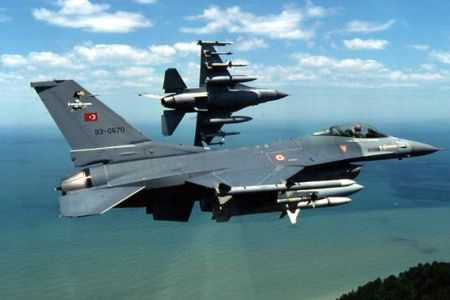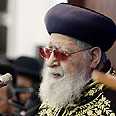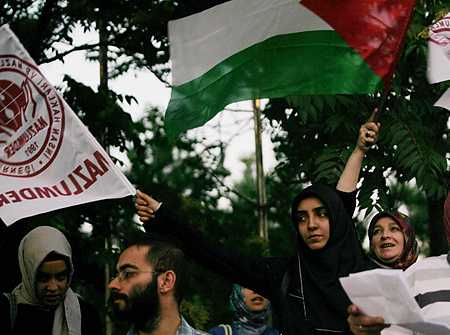ANKARA, Turkey – Turkey’s prime minister said Monday that Israel’s raid on a Gaza-bound aid flotilla last year was “cause for war” but added that his country showed “patience” and refrained from taking any action.

Erdogan made the comments before departing for a visit to Egypt later on Monday, where he will seek to boost his government’s already high standing in the Arab world — a position he has achieved in part by challenging Israel on the world stage.
Erdogan, intent on broadening Turkey’s influence in the Middle East and the Arab world, will also visit Tunisia and Libya, two other countries where popular uprisings have ousted autocratic leaders.
Erdogan told Al-Jazeera television in a recent interview that the Israeli raid, which killed eight Turks and a Turkish American on board a Turkish ship trying to break Israel’s naval blockade of Gaza, occurred in international waters and was “unlawful.” His comments were carried by Turkey’s state-run Anatolia news agency late Sunday.
“It is a cause for war, but we decided to act in line with Turkey’s grandeur and showed patience,” Erdogan said.
An Israeli government spokesman was not immediately available for comment, but Israel insists its naval commandos acted in self-defense after being attacked by some of the activists.
Israel has expressed regret for the loss of lives aboard the flotilla and said Tuesday it was time for the two countries to restore their former close ties.
An Israeli Cabinet minister, Gilad Erdan, insisted that the deterioration of relations with Turkey was not Israel’s fault.
“With Turkey, we had a very close relationship in the past, and we still hope that we can improve the relationship with Turkey, but it wasn’t our decision to deteriorate the relationship,” Erdan said in Jerusalem, adding that Israel was prepared to “pay money to the families” of the victims.
A U.N. report into the raid, released earlier this month, said Israel’s naval blockade was legitimate but accused Israel of using “excessive and unreasonable” force in the raid.
Turkey has been angered over Israel’s refusal to apologize for the raid.
In response, Turkey this month suspended its military ties with Israel, expelled top Israeli diplomats, pledged to campaign in support of the Palestinians’ statehood bid and vowed to send the Turkish navy to escort Gaza-bound aid ships in the future.
Israel insists there is no need for aid to Gaza since it eased restrictions on imports through land crossings, labeling the flotillas political provocations.
Erdogan’s visit to Egypt coincides with increasingly troubled ties between Cairo and Israel following an attack on the Israeli embassy there. Israel fears that it is being left increasingly isolated by the Arab Spring, which is changing the power dynamics in the region, alongside tense relations former ally Turkey.
Erdogan “will try to impress (the Arab) public opinion by giving messages clearly emphasizing Turkey’s rift with Israel,” said Mustafa Turkes of the Middle East Technical University’s International Relations Department.
Kamer Kasim of the Ankara-based International Strategic Research Organization said: “The Israeli-Egyptian relations are undergoing change. Israel cannot afford tensions with both Turkey and Egypt. It will have to review its security policies in the Middle East.”
Erdan said “it is very, very important” for Israel and for the Egyptians to preserve their peace treaty.
“We hope those radical movements that controlled the protests that we saw last weekend do not represent the 85 million Egyptians in Egypt,” Erdan said.
A statement from Erdogan’s office said Turkey would emphasize its support to Egypt, Tunisia and Libya in their transition to democracy.
In Egypt, Erdogan will oversee the signing of an agreement to establish a joint council to lead efforts toward a closer “strategic partnership,” as well as deals to encourage cooperation, investments and trade, a statement from the Turkish prime minister’s office said.
“Our hope now is that the Arab Spring does not turn into a harsh winter,” Erdogan told Al-Jazeera, according to Anatolia. “These countries are trying to transform into democratic system from autocratic systems. We have to lend them a helping hand in their efforts.”
Erdogan had hoped to be able to cross into Gaza from Egypt, but government officials said Sunday his scheduled would be limited to the three countries.
“Right now, there is no question of my visiting Gaza,” Erdogan told a news conference before flying to Cairo on Monday night. “But I would like to clearly say that I am longing to visit Gaza. I am longing to visit to Gaza as soon as possible.” He did not elaborate.
“I know that my brothers in Gaza are waiting for me. I too long for Gaza,” Erdogan told Al-Jazeera. “Sooner or later, if God allows it, I will go to Gaza.
Erdogan travels to Tunisia on Wednesday and to Libya on Thursday.
Turkey is also eager to resume investments in Libya, where Turkish contractors were involved in 214 building projects worth more than $15 billion before the rebellion that ousted strongman Muammar Qaddafi. Bilateral trade with Libya was $2.4 billion in Turkey’s favor before the uprising.
via Turkey Says Israel’s Flotilla Raid Was ‘Cause For War’ | Fox News.





